David Game College HND Public Services: Mental Health Report
VerifiedAdded on 2023/01/05
|9
|2907
|77
Report
AI Summary
This report, contributed by a student to Desklib, investigates the crucial aspects of mental health and wellbeing within the context of emergency services, particularly focusing on the impact of the COVID-19 pandemic. It explores the interconnectedness of physical and mental health, highlighting social and psychological factors affecting emergency service workers, and delves into the PERMA model of wellbeing. The report also examines early warning signs of stress, the benefits of early intervention, and potential social media strategies for emergency responders. Furthermore, it addresses the supervision of mental health following critical incidents and the impact of policy in promoting wellbeing, concluding with practical tips and techniques to help workers manage stress. The report provides a comprehensive overview of the challenges and potential solutions in supporting the mental health of those working in emergency services.
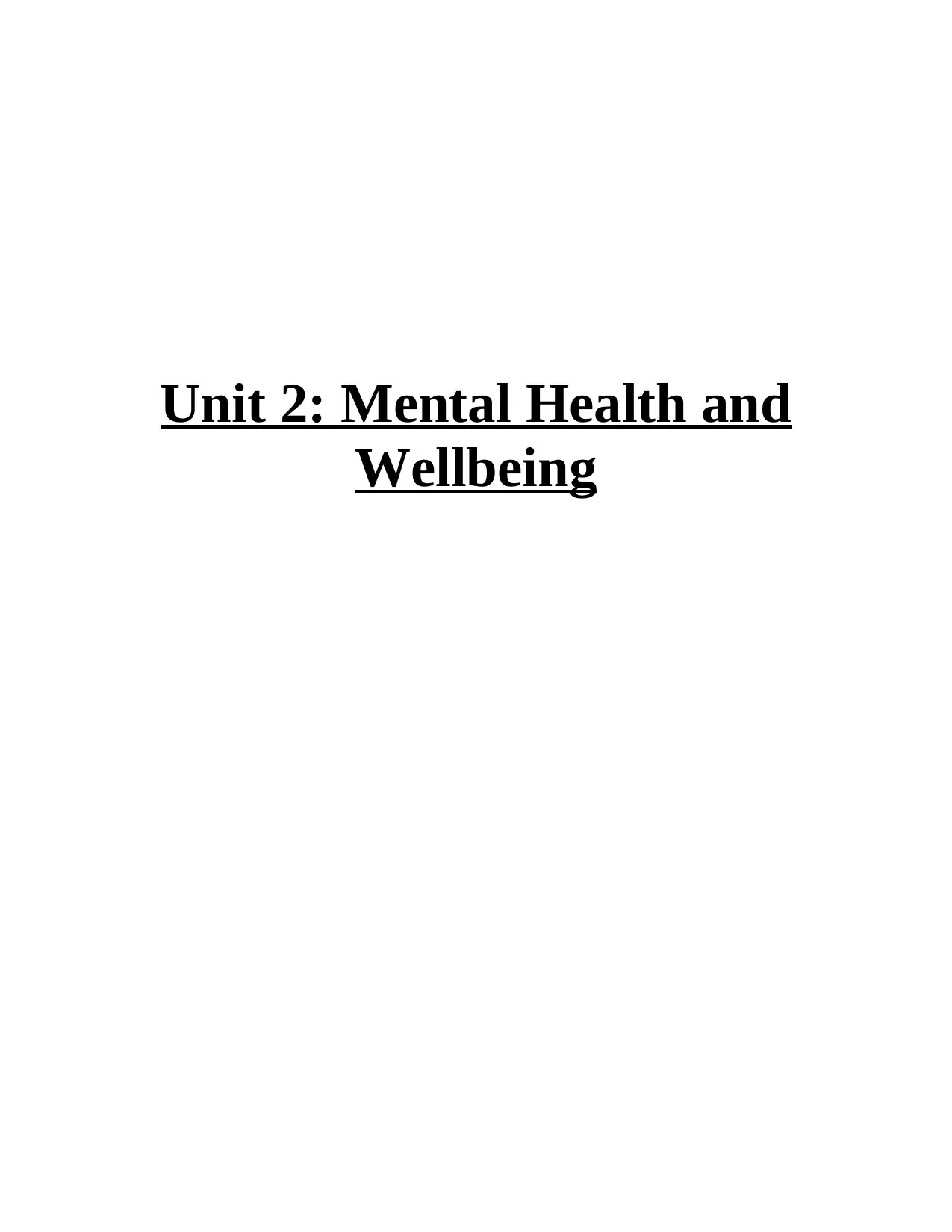
Unit 2: Mental Health and
Wellbeing
Wellbeing
Paraphrase This Document
Need a fresh take? Get an instant paraphrase of this document with our AI Paraphraser
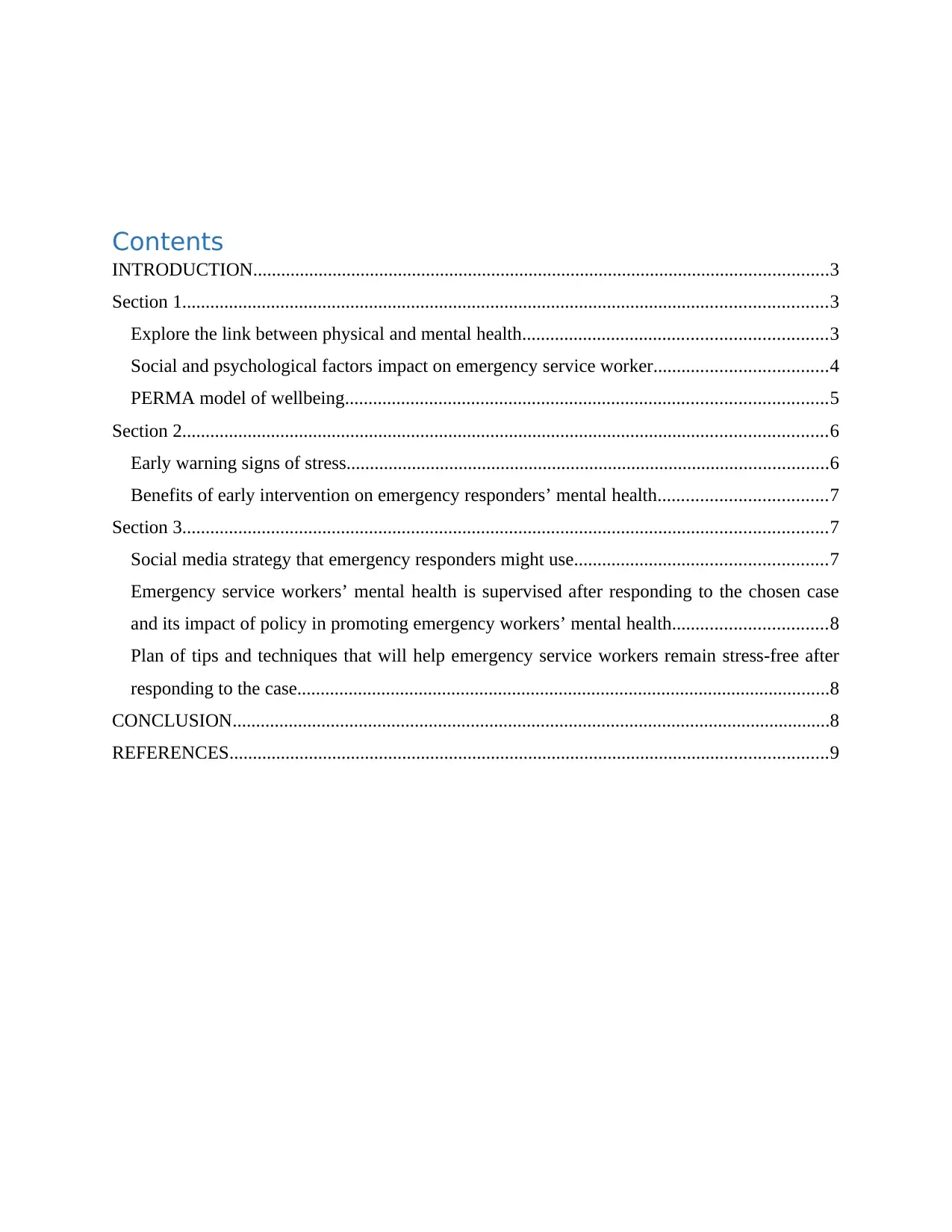
Contents
INTRODUCTION...........................................................................................................................3
Section 1..........................................................................................................................................3
Explore the link between physical and mental health.................................................................3
Social and psychological factors impact on emergency service worker.....................................4
PERMA model of wellbeing.......................................................................................................5
Section 2..........................................................................................................................................6
Early warning signs of stress.......................................................................................................6
Benefits of early intervention on emergency responders’ mental health....................................7
Section 3..........................................................................................................................................7
Social media strategy that emergency responders might use......................................................7
Emergency service workers’ mental health is supervised after responding to the chosen case
and its impact of policy in promoting emergency workers’ mental health.................................8
Plan of tips and techniques that will help emergency service workers remain stress-free after
responding to the case..................................................................................................................8
CONCLUSION................................................................................................................................8
REFERENCES................................................................................................................................9
INTRODUCTION...........................................................................................................................3
Section 1..........................................................................................................................................3
Explore the link between physical and mental health.................................................................3
Social and psychological factors impact on emergency service worker.....................................4
PERMA model of wellbeing.......................................................................................................5
Section 2..........................................................................................................................................6
Early warning signs of stress.......................................................................................................6
Benefits of early intervention on emergency responders’ mental health....................................7
Section 3..........................................................................................................................................7
Social media strategy that emergency responders might use......................................................7
Emergency service workers’ mental health is supervised after responding to the chosen case
and its impact of policy in promoting emergency workers’ mental health.................................8
Plan of tips and techniques that will help emergency service workers remain stress-free after
responding to the case..................................................................................................................8
CONCLUSION................................................................................................................................8
REFERENCES................................................................................................................................9
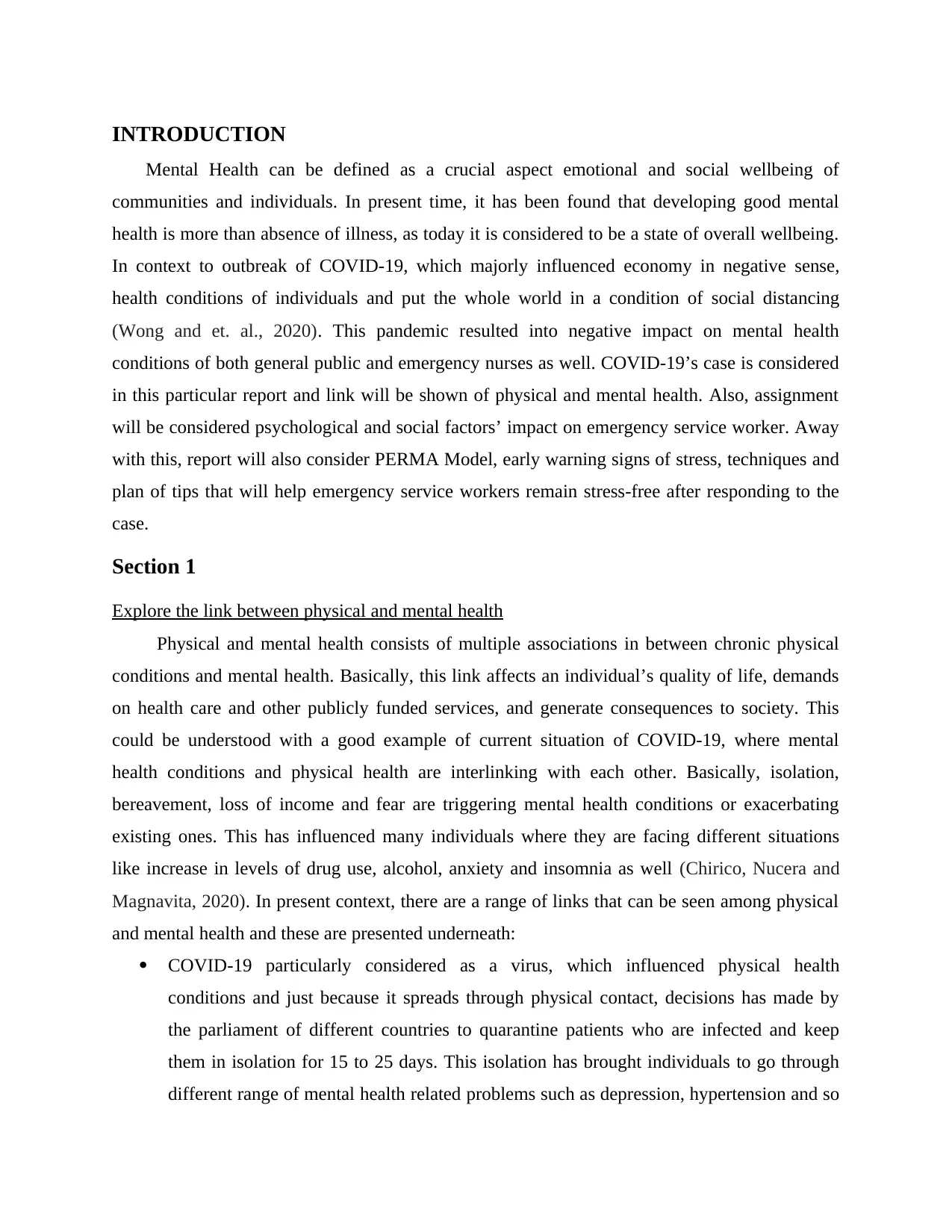
INTRODUCTION
Mental Health can be defined as a crucial aspect emotional and social wellbeing of
communities and individuals. In present time, it has been found that developing good mental
health is more than absence of illness, as today it is considered to be a state of overall wellbeing.
In context to outbreak of COVID-19, which majorly influenced economy in negative sense,
health conditions of individuals and put the whole world in a condition of social distancing
(Wong and et. al., 2020). This pandemic resulted into negative impact on mental health
conditions of both general public and emergency nurses as well. COVID-19’s case is considered
in this particular report and link will be shown of physical and mental health. Also, assignment
will be considered psychological and social factors’ impact on emergency service worker. Away
with this, report will also consider PERMA Model, early warning signs of stress, techniques and
plan of tips that will help emergency service workers remain stress-free after responding to the
case.
Section 1
Explore the link between physical and mental health
Physical and mental health consists of multiple associations in between chronic physical
conditions and mental health. Basically, this link affects an individual’s quality of life, demands
on health care and other publicly funded services, and generate consequences to society. This
could be understood with a good example of current situation of COVID-19, where mental
health conditions and physical health are interlinking with each other. Basically, isolation,
bereavement, loss of income and fear are triggering mental health conditions or exacerbating
existing ones. This has influenced many individuals where they are facing different situations
like increase in levels of drug use, alcohol, anxiety and insomnia as well (Chirico, Nucera and
Magnavita, 2020). In present context, there are a range of links that can be seen among physical
and mental health and these are presented underneath:
COVID-19 particularly considered as a virus, which influenced physical health
conditions and just because it spreads through physical contact, decisions has made by
the parliament of different countries to quarantine patients who are infected and keep
them in isolation for 15 to 25 days. This isolation has brought individuals to go through
different range of mental health related problems such as depression, hypertension and so
Mental Health can be defined as a crucial aspect emotional and social wellbeing of
communities and individuals. In present time, it has been found that developing good mental
health is more than absence of illness, as today it is considered to be a state of overall wellbeing.
In context to outbreak of COVID-19, which majorly influenced economy in negative sense,
health conditions of individuals and put the whole world in a condition of social distancing
(Wong and et. al., 2020). This pandemic resulted into negative impact on mental health
conditions of both general public and emergency nurses as well. COVID-19’s case is considered
in this particular report and link will be shown of physical and mental health. Also, assignment
will be considered psychological and social factors’ impact on emergency service worker. Away
with this, report will also consider PERMA Model, early warning signs of stress, techniques and
plan of tips that will help emergency service workers remain stress-free after responding to the
case.
Section 1
Explore the link between physical and mental health
Physical and mental health consists of multiple associations in between chronic physical
conditions and mental health. Basically, this link affects an individual’s quality of life, demands
on health care and other publicly funded services, and generate consequences to society. This
could be understood with a good example of current situation of COVID-19, where mental
health conditions and physical health are interlinking with each other. Basically, isolation,
bereavement, loss of income and fear are triggering mental health conditions or exacerbating
existing ones. This has influenced many individuals where they are facing different situations
like increase in levels of drug use, alcohol, anxiety and insomnia as well (Chirico, Nucera and
Magnavita, 2020). In present context, there are a range of links that can be seen among physical
and mental health and these are presented underneath:
COVID-19 particularly considered as a virus, which influenced physical health
conditions and just because it spreads through physical contact, decisions has made by
the parliament of different countries to quarantine patients who are infected and keep
them in isolation for 15 to 25 days. This isolation has brought individuals to go through
different range of mental health related problems such as depression, hypertension and so
⊘ This is a preview!⊘
Do you want full access?
Subscribe today to unlock all pages.

Trusted by 1+ million students worldwide
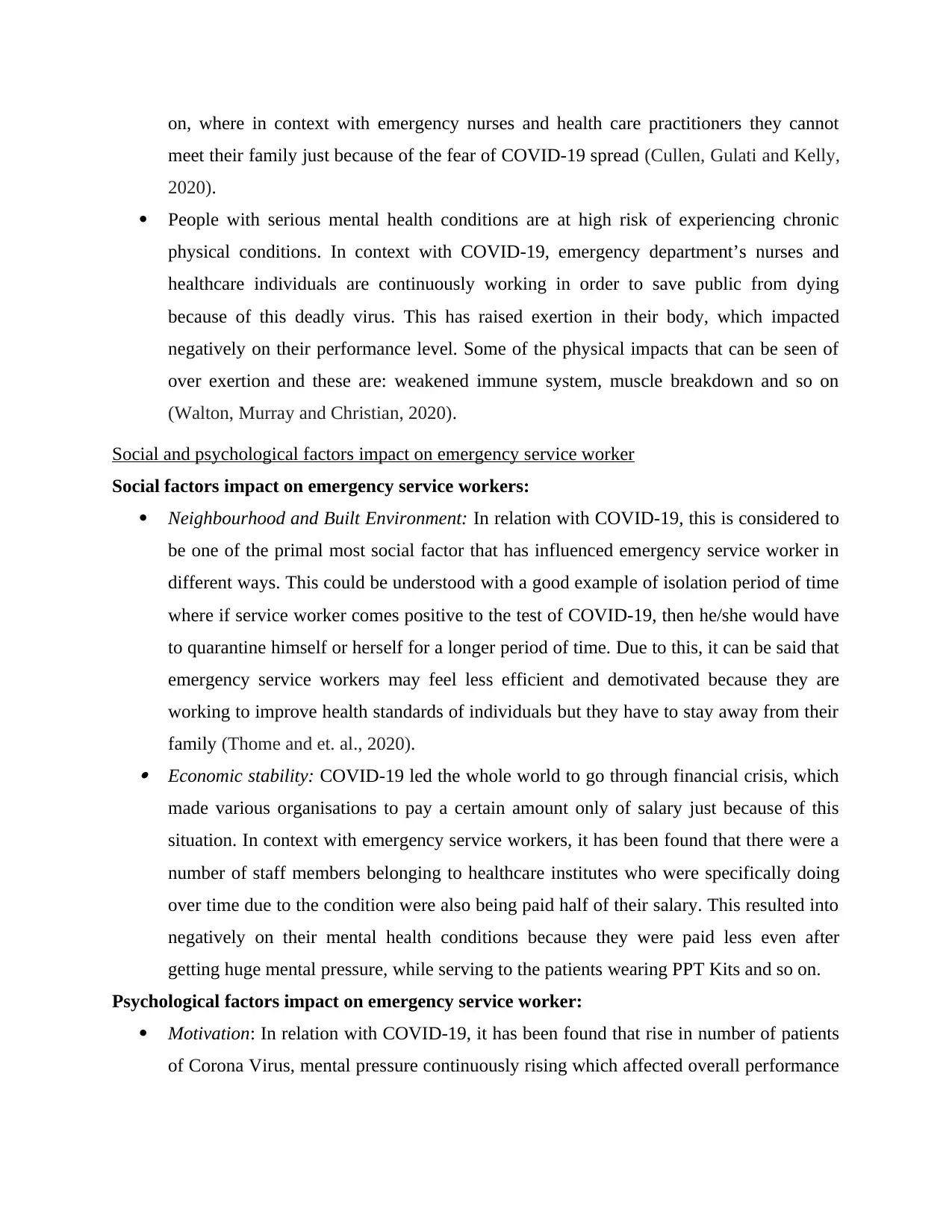
on, where in context with emergency nurses and health care practitioners they cannot
meet their family just because of the fear of COVID-19 spread (Cullen, Gulati and Kelly,
2020).
People with serious mental health conditions are at high risk of experiencing chronic
physical conditions. In context with COVID-19, emergency department’s nurses and
healthcare individuals are continuously working in order to save public from dying
because of this deadly virus. This has raised exertion in their body, which impacted
negatively on their performance level. Some of the physical impacts that can be seen of
over exertion and these are: weakened immune system, muscle breakdown and so on
(Walton, Murray and Christian, 2020).
Social and psychological factors impact on emergency service worker
Social factors impact on emergency service workers:
Neighbourhood and Built Environment: In relation with COVID-19, this is considered to
be one of the primal most social factor that has influenced emergency service worker in
different ways. This could be understood with a good example of isolation period of time
where if service worker comes positive to the test of COVID-19, then he/she would have
to quarantine himself or herself for a longer period of time. Due to this, it can be said that
emergency service workers may feel less efficient and demotivated because they are
working to improve health standards of individuals but they have to stay away from their
family (Thome and et. al., 2020). Economic stability: COVID-19 led the whole world to go through financial crisis, which
made various organisations to pay a certain amount only of salary just because of this
situation. In context with emergency service workers, it has been found that there were a
number of staff members belonging to healthcare institutes who were specifically doing
over time due to the condition were also being paid half of their salary. This resulted into
negatively on their mental health conditions because they were paid less even after
getting huge mental pressure, while serving to the patients wearing PPT Kits and so on.
Psychological factors impact on emergency service worker:
Motivation: In relation with COVID-19, it has been found that rise in number of patients
of Corona Virus, mental pressure continuously rising which affected overall performance
meet their family just because of the fear of COVID-19 spread (Cullen, Gulati and Kelly,
2020).
People with serious mental health conditions are at high risk of experiencing chronic
physical conditions. In context with COVID-19, emergency department’s nurses and
healthcare individuals are continuously working in order to save public from dying
because of this deadly virus. This has raised exertion in their body, which impacted
negatively on their performance level. Some of the physical impacts that can be seen of
over exertion and these are: weakened immune system, muscle breakdown and so on
(Walton, Murray and Christian, 2020).
Social and psychological factors impact on emergency service worker
Social factors impact on emergency service workers:
Neighbourhood and Built Environment: In relation with COVID-19, this is considered to
be one of the primal most social factor that has influenced emergency service worker in
different ways. This could be understood with a good example of isolation period of time
where if service worker comes positive to the test of COVID-19, then he/she would have
to quarantine himself or herself for a longer period of time. Due to this, it can be said that
emergency service workers may feel less efficient and demotivated because they are
working to improve health standards of individuals but they have to stay away from their
family (Thome and et. al., 2020). Economic stability: COVID-19 led the whole world to go through financial crisis, which
made various organisations to pay a certain amount only of salary just because of this
situation. In context with emergency service workers, it has been found that there were a
number of staff members belonging to healthcare institutes who were specifically doing
over time due to the condition were also being paid half of their salary. This resulted into
negatively on their mental health conditions because they were paid less even after
getting huge mental pressure, while serving to the patients wearing PPT Kits and so on.
Psychological factors impact on emergency service worker:
Motivation: In relation with COVID-19, it has been found that rise in number of patients
of Corona Virus, mental pressure continuously rising which affected overall performance
Paraphrase This Document
Need a fresh take? Get an instant paraphrase of this document with our AI Paraphraser
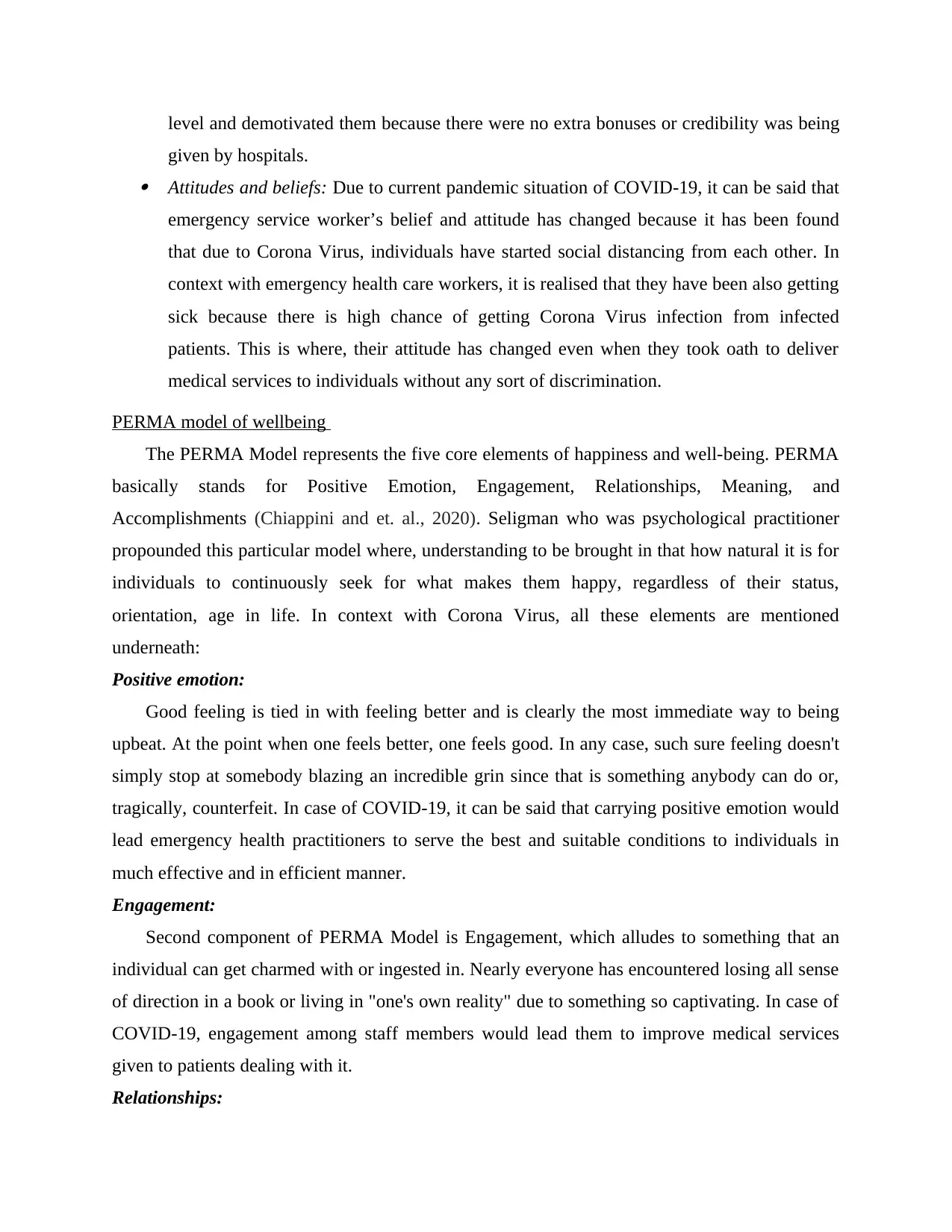
level and demotivated them because there were no extra bonuses or credibility was being
given by hospitals. Attitudes and beliefs: Due to current pandemic situation of COVID-19, it can be said that
emergency service worker’s belief and attitude has changed because it has been found
that due to Corona Virus, individuals have started social distancing from each other. In
context with emergency health care workers, it is realised that they have been also getting
sick because there is high chance of getting Corona Virus infection from infected
patients. This is where, their attitude has changed even when they took oath to deliver
medical services to individuals without any sort of discrimination.
PERMA model of wellbeing
The PERMA Model represents the five core elements of happiness and well-being. PERMA
basically stands for Positive Emotion, Engagement, Relationships, Meaning, and
Accomplishments (Chiappini and et. al., 2020). Seligman who was psychological practitioner
propounded this particular model where, understanding to be brought in that how natural it is for
individuals to continuously seek for what makes them happy, regardless of their status,
orientation, age in life. In context with Corona Virus, all these elements are mentioned
underneath:
Positive emotion:
Good feeling is tied in with feeling better and is clearly the most immediate way to being
upbeat. At the point when one feels better, one feels good. In any case, such sure feeling doesn't
simply stop at somebody blazing an incredible grin since that is something anybody can do or,
tragically, counterfeit. In case of COVID-19, it can be said that carrying positive emotion would
lead emergency health practitioners to serve the best and suitable conditions to individuals in
much effective and in efficient manner.
Engagement:
Second component of PERMA Model is Engagement, which alludes to something that an
individual can get charmed with or ingested in. Nearly everyone has encountered losing all sense
of direction in a book or living in "one's own reality" due to something so captivating. In case of
COVID-19, engagement among staff members would lead them to improve medical services
given to patients dealing with it.
Relationships:
given by hospitals. Attitudes and beliefs: Due to current pandemic situation of COVID-19, it can be said that
emergency service worker’s belief and attitude has changed because it has been found
that due to Corona Virus, individuals have started social distancing from each other. In
context with emergency health care workers, it is realised that they have been also getting
sick because there is high chance of getting Corona Virus infection from infected
patients. This is where, their attitude has changed even when they took oath to deliver
medical services to individuals without any sort of discrimination.
PERMA model of wellbeing
The PERMA Model represents the five core elements of happiness and well-being. PERMA
basically stands for Positive Emotion, Engagement, Relationships, Meaning, and
Accomplishments (Chiappini and et. al., 2020). Seligman who was psychological practitioner
propounded this particular model where, understanding to be brought in that how natural it is for
individuals to continuously seek for what makes them happy, regardless of their status,
orientation, age in life. In context with Corona Virus, all these elements are mentioned
underneath:
Positive emotion:
Good feeling is tied in with feeling better and is clearly the most immediate way to being
upbeat. At the point when one feels better, one feels good. In any case, such sure feeling doesn't
simply stop at somebody blazing an incredible grin since that is something anybody can do or,
tragically, counterfeit. In case of COVID-19, it can be said that carrying positive emotion would
lead emergency health practitioners to serve the best and suitable conditions to individuals in
much effective and in efficient manner.
Engagement:
Second component of PERMA Model is Engagement, which alludes to something that an
individual can get charmed with or ingested in. Nearly everyone has encountered losing all sense
of direction in a book or living in "one's own reality" due to something so captivating. In case of
COVID-19, engagement among staff members would lead them to improve medical services
given to patients dealing with it.
Relationships:
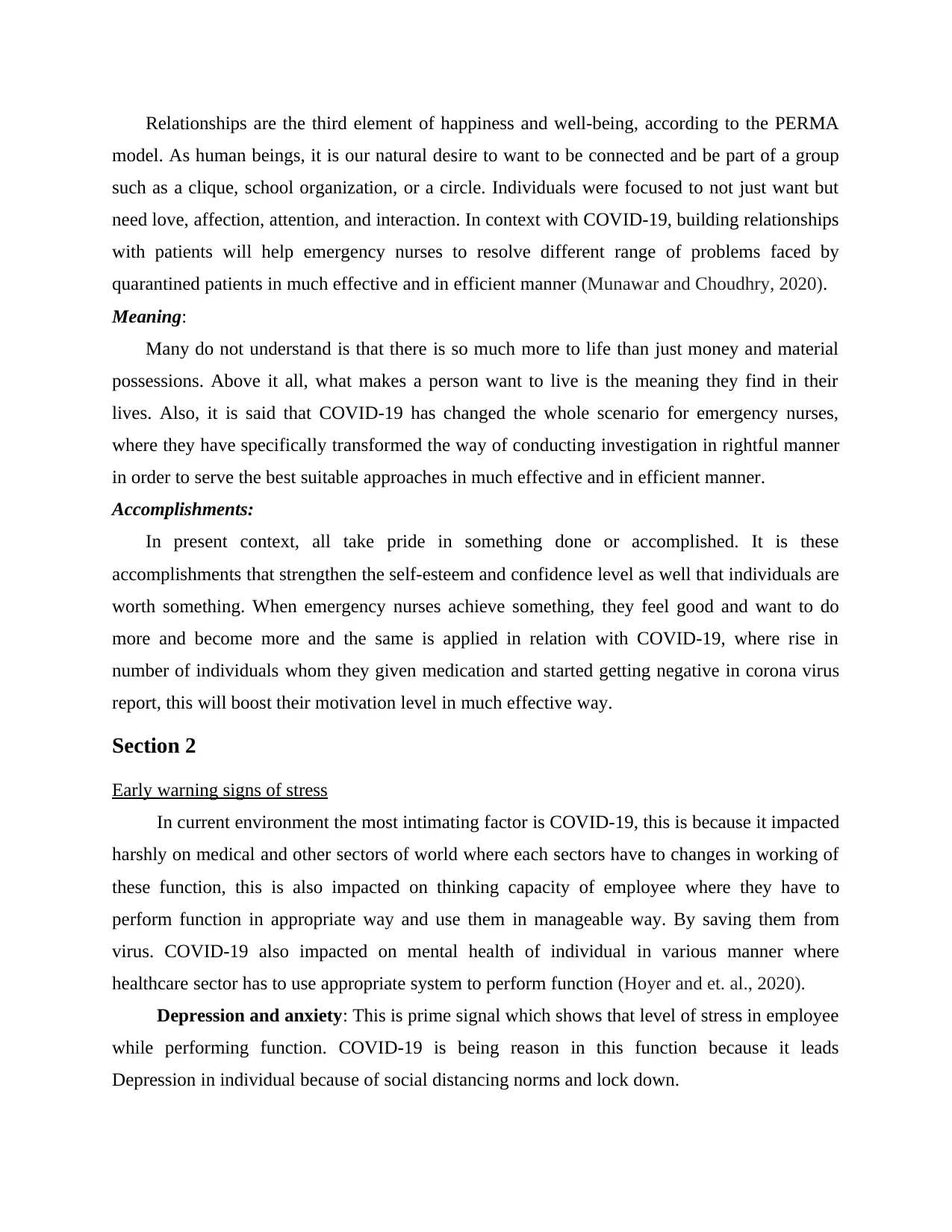
Relationships are the third element of happiness and well-being, according to the PERMA
model. As human beings, it is our natural desire to want to be connected and be part of a group
such as a clique, school organization, or a circle. Individuals were focused to not just want but
need love, affection, attention, and interaction. In context with COVID-19, building relationships
with patients will help emergency nurses to resolve different range of problems faced by
quarantined patients in much effective and in efficient manner (Munawar and Choudhry, 2020).
Meaning:
Many do not understand is that there is so much more to life than just money and material
possessions. Above it all, what makes a person want to live is the meaning they find in their
lives. Also, it is said that COVID-19 has changed the whole scenario for emergency nurses,
where they have specifically transformed the way of conducting investigation in rightful manner
in order to serve the best suitable approaches in much effective and in efficient manner.
Accomplishments:
In present context, all take pride in something done or accomplished. It is these
accomplishments that strengthen the self-esteem and confidence level as well that individuals are
worth something. When emergency nurses achieve something, they feel good and want to do
more and become more and the same is applied in relation with COVID-19, where rise in
number of individuals whom they given medication and started getting negative in corona virus
report, this will boost their motivation level in much effective way.
Section 2
Early warning signs of stress
In current environment the most intimating factor is COVID-19, this is because it impacted
harshly on medical and other sectors of world where each sectors have to changes in working of
these function, this is also impacted on thinking capacity of employee where they have to
perform function in appropriate way and use them in manageable way. By saving them from
virus. COVID-19 also impacted on mental health of individual in various manner where
healthcare sector has to use appropriate system to perform function (Hoyer and et. al., 2020).
Depression and anxiety: This is prime signal which shows that level of stress in employee
while performing function. COVID-19 is being reason in this function because it leads
Depression in individual because of social distancing norms and lock down.
model. As human beings, it is our natural desire to want to be connected and be part of a group
such as a clique, school organization, or a circle. Individuals were focused to not just want but
need love, affection, attention, and interaction. In context with COVID-19, building relationships
with patients will help emergency nurses to resolve different range of problems faced by
quarantined patients in much effective and in efficient manner (Munawar and Choudhry, 2020).
Meaning:
Many do not understand is that there is so much more to life than just money and material
possessions. Above it all, what makes a person want to live is the meaning they find in their
lives. Also, it is said that COVID-19 has changed the whole scenario for emergency nurses,
where they have specifically transformed the way of conducting investigation in rightful manner
in order to serve the best suitable approaches in much effective and in efficient manner.
Accomplishments:
In present context, all take pride in something done or accomplished. It is these
accomplishments that strengthen the self-esteem and confidence level as well that individuals are
worth something. When emergency nurses achieve something, they feel good and want to do
more and become more and the same is applied in relation with COVID-19, where rise in
number of individuals whom they given medication and started getting negative in corona virus
report, this will boost their motivation level in much effective way.
Section 2
Early warning signs of stress
In current environment the most intimating factor is COVID-19, this is because it impacted
harshly on medical and other sectors of world where each sectors have to changes in working of
these function, this is also impacted on thinking capacity of employee where they have to
perform function in appropriate way and use them in manageable way. By saving them from
virus. COVID-19 also impacted on mental health of individual in various manner where
healthcare sector has to use appropriate system to perform function (Hoyer and et. al., 2020).
Depression and anxiety: This is prime signal which shows that level of stress in employee
while performing function. COVID-19 is being reason in this function because it leads
Depression in individual because of social distancing norms and lock down.
⊘ This is a preview!⊘
Do you want full access?
Subscribe today to unlock all pages.

Trusted by 1+ million students worldwide
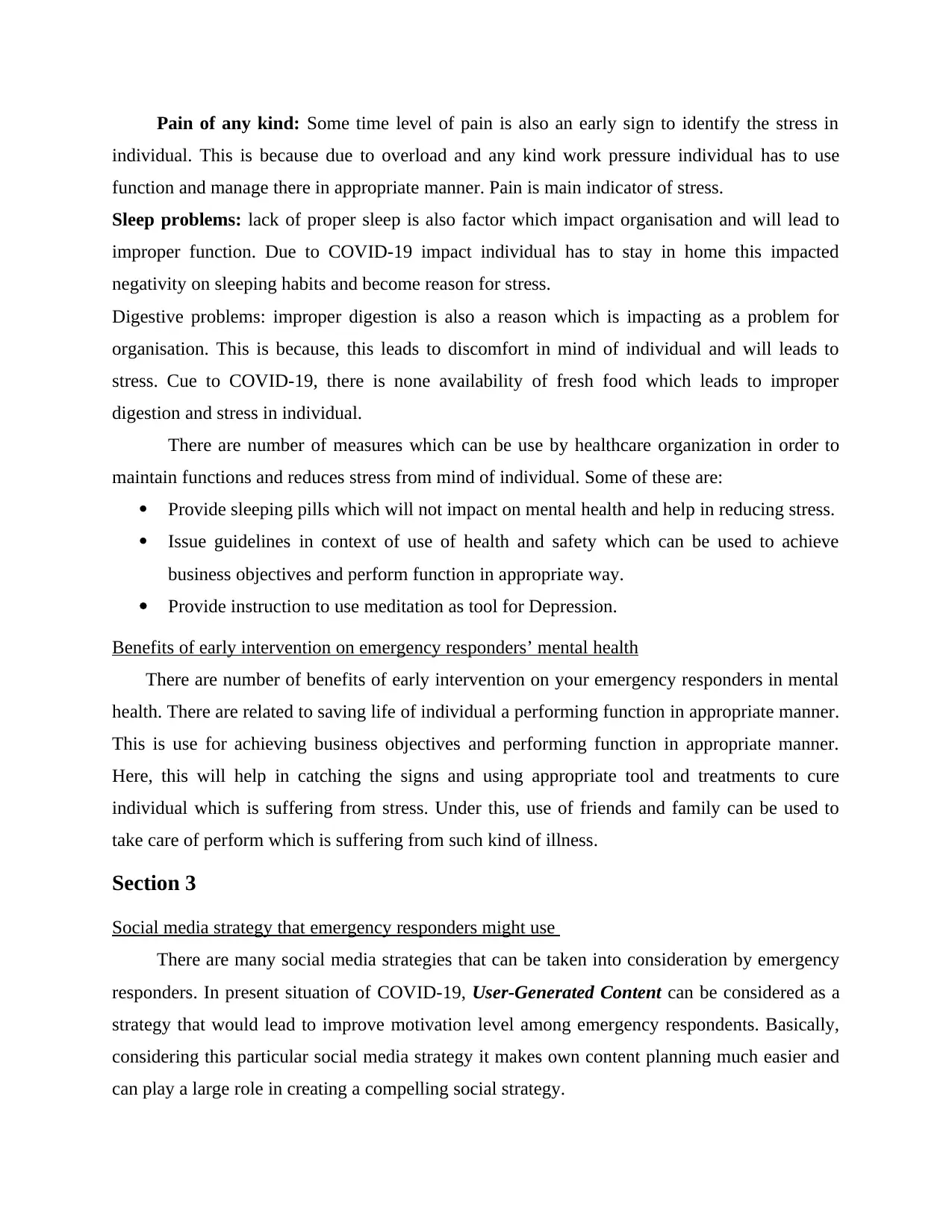
Pain of any kind: Some time level of pain is also an early sign to identify the stress in
individual. This is because due to overload and any kind work pressure individual has to use
function and manage there in appropriate manner. Pain is main indicator of stress.
Sleep problems: lack of proper sleep is also factor which impact organisation and will lead to
improper function. Due to COVID-19 impact individual has to stay in home this impacted
negativity on sleeping habits and become reason for stress.
Digestive problems: improper digestion is also a reason which is impacting as a problem for
organisation. This is because, this leads to discomfort in mind of individual and will leads to
stress. Cue to COVID-19, there is none availability of fresh food which leads to improper
digestion and stress in individual.
There are number of measures which can be use by healthcare organization in order to
maintain functions and reduces stress from mind of individual. Some of these are:
Provide sleeping pills which will not impact on mental health and help in reducing stress.
Issue guidelines in context of use of health and safety which can be used to achieve
business objectives and perform function in appropriate way.
Provide instruction to use meditation as tool for Depression.
Benefits of early intervention on emergency responders’ mental health
There are number of benefits of early intervention on your emergency responders in mental
health. There are related to saving life of individual a performing function in appropriate manner.
This is use for achieving business objectives and performing function in appropriate manner.
Here, this will help in catching the signs and using appropriate tool and treatments to cure
individual which is suffering from stress. Under this, use of friends and family can be used to
take care of perform which is suffering from such kind of illness.
Section 3
Social media strategy that emergency responders might use
There are many social media strategies that can be taken into consideration by emergency
responders. In present situation of COVID-19, User-Generated Content can be considered as a
strategy that would lead to improve motivation level among emergency respondents. Basically,
considering this particular social media strategy it makes own content planning much easier and
can play a large role in creating a compelling social strategy.
individual. This is because due to overload and any kind work pressure individual has to use
function and manage there in appropriate manner. Pain is main indicator of stress.
Sleep problems: lack of proper sleep is also factor which impact organisation and will lead to
improper function. Due to COVID-19 impact individual has to stay in home this impacted
negativity on sleeping habits and become reason for stress.
Digestive problems: improper digestion is also a reason which is impacting as a problem for
organisation. This is because, this leads to discomfort in mind of individual and will leads to
stress. Cue to COVID-19, there is none availability of fresh food which leads to improper
digestion and stress in individual.
There are number of measures which can be use by healthcare organization in order to
maintain functions and reduces stress from mind of individual. Some of these are:
Provide sleeping pills which will not impact on mental health and help in reducing stress.
Issue guidelines in context of use of health and safety which can be used to achieve
business objectives and perform function in appropriate way.
Provide instruction to use meditation as tool for Depression.
Benefits of early intervention on emergency responders’ mental health
There are number of benefits of early intervention on your emergency responders in mental
health. There are related to saving life of individual a performing function in appropriate manner.
This is use for achieving business objectives and performing function in appropriate manner.
Here, this will help in catching the signs and using appropriate tool and treatments to cure
individual which is suffering from stress. Under this, use of friends and family can be used to
take care of perform which is suffering from such kind of illness.
Section 3
Social media strategy that emergency responders might use
There are many social media strategies that can be taken into consideration by emergency
responders. In present situation of COVID-19, User-Generated Content can be considered as a
strategy that would lead to improve motivation level among emergency respondents. Basically,
considering this particular social media strategy it makes own content planning much easier and
can play a large role in creating a compelling social strategy.
Paraphrase This Document
Need a fresh take? Get an instant paraphrase of this document with our AI Paraphraser
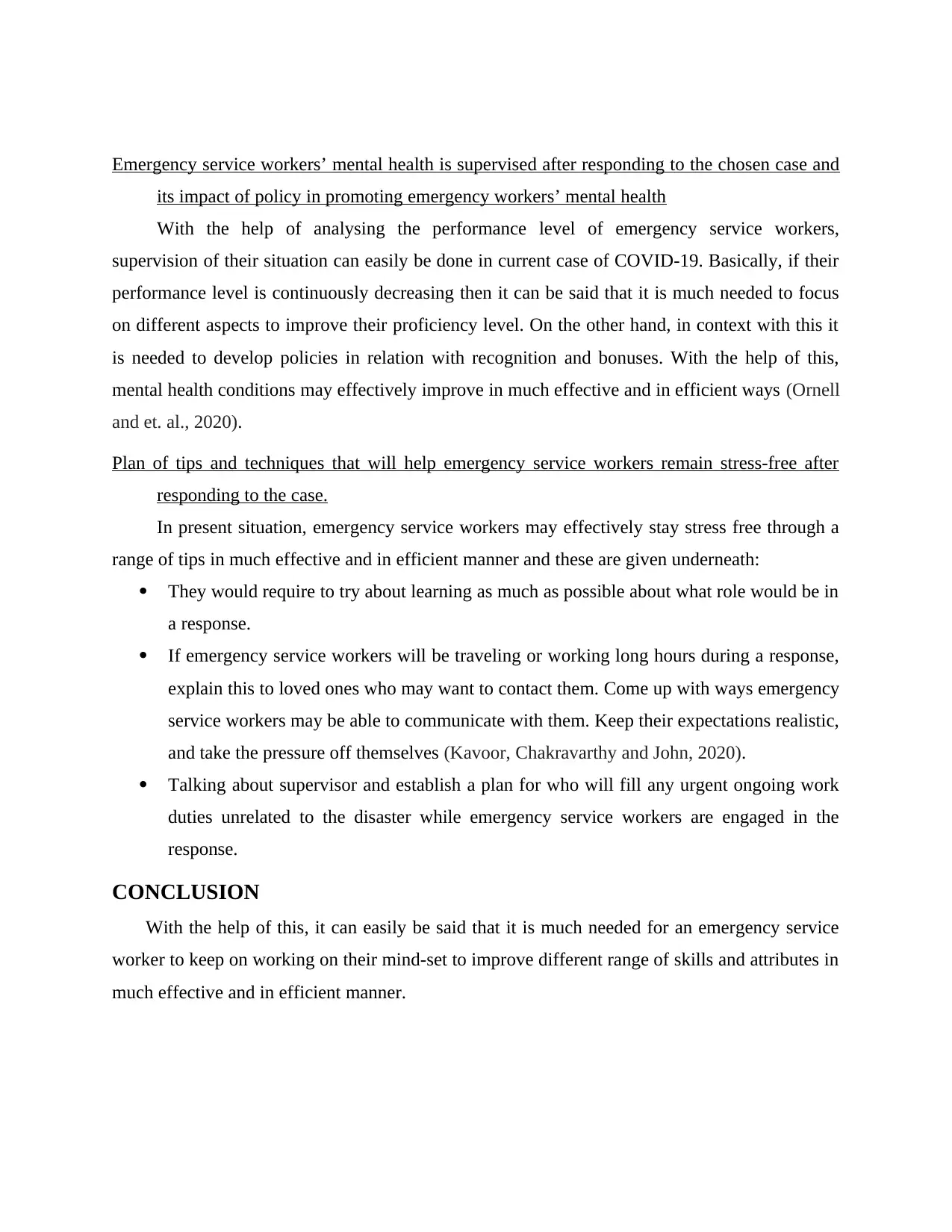
Emergency service workers’ mental health is supervised after responding to the chosen case and
its impact of policy in promoting emergency workers’ mental health
With the help of analysing the performance level of emergency service workers,
supervision of their situation can easily be done in current case of COVID-19. Basically, if their
performance level is continuously decreasing then it can be said that it is much needed to focus
on different aspects to improve their proficiency level. On the other hand, in context with this it
is needed to develop policies in relation with recognition and bonuses. With the help of this,
mental health conditions may effectively improve in much effective and in efficient ways (Ornell
and et. al., 2020).
Plan of tips and techniques that will help emergency service workers remain stress-free after
responding to the case.
In present situation, emergency service workers may effectively stay stress free through a
range of tips in much effective and in efficient manner and these are given underneath:
They would require to try about learning as much as possible about what role would be in
a response.
If emergency service workers will be traveling or working long hours during a response,
explain this to loved ones who may want to contact them. Come up with ways emergency
service workers may be able to communicate with them. Keep their expectations realistic,
and take the pressure off themselves (Kavoor, Chakravarthy and John, 2020).
Talking about supervisor and establish a plan for who will fill any urgent ongoing work
duties unrelated to the disaster while emergency service workers are engaged in the
response.
CONCLUSION
With the help of this, it can easily be said that it is much needed for an emergency service
worker to keep on working on their mind-set to improve different range of skills and attributes in
much effective and in efficient manner.
its impact of policy in promoting emergency workers’ mental health
With the help of analysing the performance level of emergency service workers,
supervision of their situation can easily be done in current case of COVID-19. Basically, if their
performance level is continuously decreasing then it can be said that it is much needed to focus
on different aspects to improve their proficiency level. On the other hand, in context with this it
is needed to develop policies in relation with recognition and bonuses. With the help of this,
mental health conditions may effectively improve in much effective and in efficient ways (Ornell
and et. al., 2020).
Plan of tips and techniques that will help emergency service workers remain stress-free after
responding to the case.
In present situation, emergency service workers may effectively stay stress free through a
range of tips in much effective and in efficient manner and these are given underneath:
They would require to try about learning as much as possible about what role would be in
a response.
If emergency service workers will be traveling or working long hours during a response,
explain this to loved ones who may want to contact them. Come up with ways emergency
service workers may be able to communicate with them. Keep their expectations realistic,
and take the pressure off themselves (Kavoor, Chakravarthy and John, 2020).
Talking about supervisor and establish a plan for who will fill any urgent ongoing work
duties unrelated to the disaster while emergency service workers are engaged in the
response.
CONCLUSION
With the help of this, it can easily be said that it is much needed for an emergency service
worker to keep on working on their mind-set to improve different range of skills and attributes in
much effective and in efficient manner.
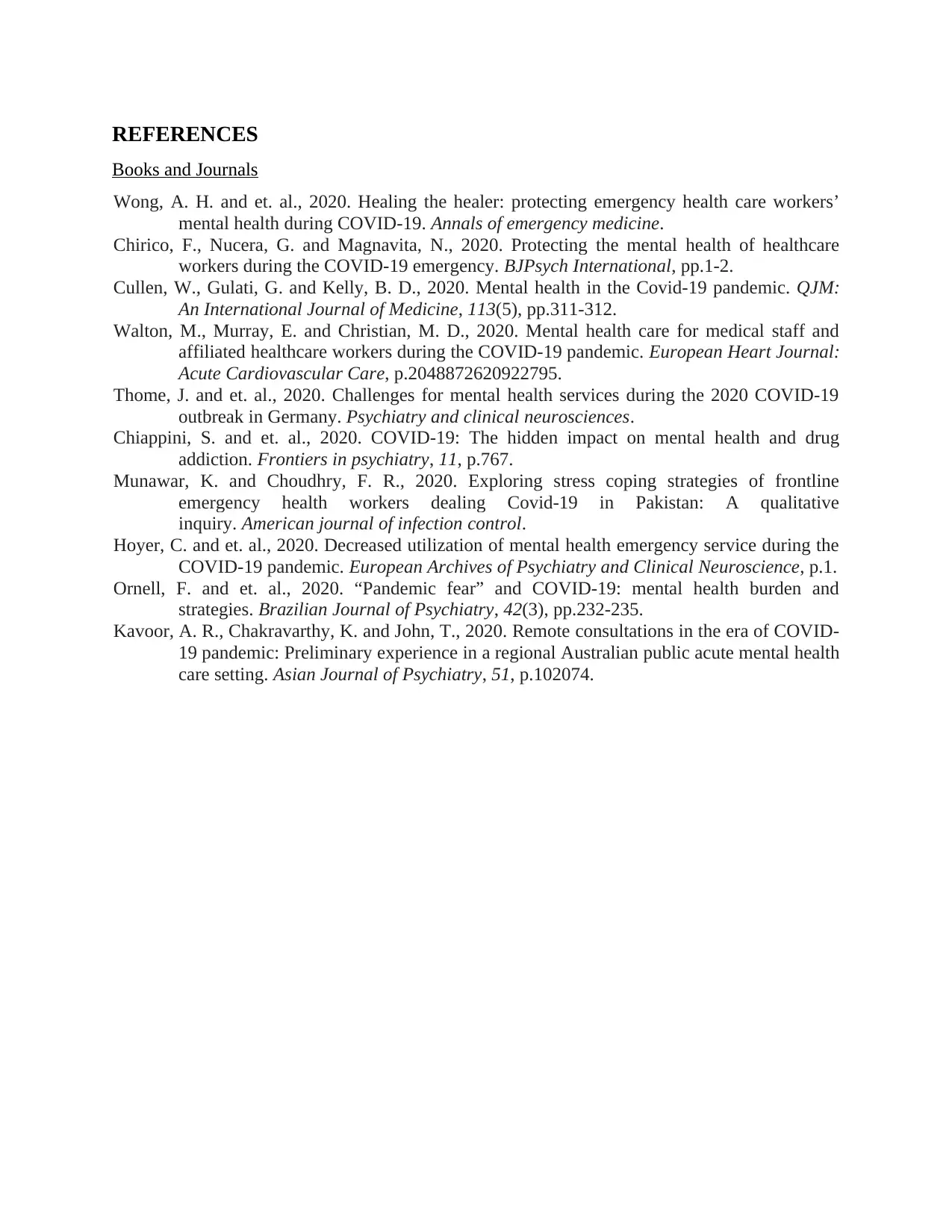
REFERENCES
Books and Journals
Wong, A. H. and et. al., 2020. Healing the healer: protecting emergency health care workers’
mental health during COVID-19. Annals of emergency medicine.
Chirico, F., Nucera, G. and Magnavita, N., 2020. Protecting the mental health of healthcare
workers during the COVID-19 emergency. BJPsych International, pp.1-2.
Cullen, W., Gulati, G. and Kelly, B. D., 2020. Mental health in the Covid-19 pandemic. QJM:
An International Journal of Medicine, 113(5), pp.311-312.
Walton, M., Murray, E. and Christian, M. D., 2020. Mental health care for medical staff and
affiliated healthcare workers during the COVID-19 pandemic. European Heart Journal:
Acute Cardiovascular Care, p.2048872620922795.
Thome, J. and et. al., 2020. Challenges for mental health services during the 2020 COVID‐19
outbreak in Germany. Psychiatry and clinical neurosciences.
Chiappini, S. and et. al., 2020. COVID-19: The hidden impact on mental health and drug
addiction. Frontiers in psychiatry, 11, p.767.
Munawar, K. and Choudhry, F. R., 2020. Exploring stress coping strategies of frontline
emergency health workers dealing Covid-19 in Pakistan: A qualitative
inquiry. American journal of infection control.
Hoyer, C. and et. al., 2020. Decreased utilization of mental health emergency service during the
COVID-19 pandemic. European Archives of Psychiatry and Clinical Neuroscience, p.1.
Ornell, F. and et. al., 2020. “Pandemic fear” and COVID-19: mental health burden and
strategies. Brazilian Journal of Psychiatry, 42(3), pp.232-235.
Kavoor, A. R., Chakravarthy, K. and John, T., 2020. Remote consultations in the era of COVID-
19 pandemic: Preliminary experience in a regional Australian public acute mental health
care setting. Asian Journal of Psychiatry, 51, p.102074.
Books and Journals
Wong, A. H. and et. al., 2020. Healing the healer: protecting emergency health care workers’
mental health during COVID-19. Annals of emergency medicine.
Chirico, F., Nucera, G. and Magnavita, N., 2020. Protecting the mental health of healthcare
workers during the COVID-19 emergency. BJPsych International, pp.1-2.
Cullen, W., Gulati, G. and Kelly, B. D., 2020. Mental health in the Covid-19 pandemic. QJM:
An International Journal of Medicine, 113(5), pp.311-312.
Walton, M., Murray, E. and Christian, M. D., 2020. Mental health care for medical staff and
affiliated healthcare workers during the COVID-19 pandemic. European Heart Journal:
Acute Cardiovascular Care, p.2048872620922795.
Thome, J. and et. al., 2020. Challenges for mental health services during the 2020 COVID‐19
outbreak in Germany. Psychiatry and clinical neurosciences.
Chiappini, S. and et. al., 2020. COVID-19: The hidden impact on mental health and drug
addiction. Frontiers in psychiatry, 11, p.767.
Munawar, K. and Choudhry, F. R., 2020. Exploring stress coping strategies of frontline
emergency health workers dealing Covid-19 in Pakistan: A qualitative
inquiry. American journal of infection control.
Hoyer, C. and et. al., 2020. Decreased utilization of mental health emergency service during the
COVID-19 pandemic. European Archives of Psychiatry and Clinical Neuroscience, p.1.
Ornell, F. and et. al., 2020. “Pandemic fear” and COVID-19: mental health burden and
strategies. Brazilian Journal of Psychiatry, 42(3), pp.232-235.
Kavoor, A. R., Chakravarthy, K. and John, T., 2020. Remote consultations in the era of COVID-
19 pandemic: Preliminary experience in a regional Australian public acute mental health
care setting. Asian Journal of Psychiatry, 51, p.102074.
⊘ This is a preview!⊘
Do you want full access?
Subscribe today to unlock all pages.

Trusted by 1+ million students worldwide
1 out of 9
Related Documents
Your All-in-One AI-Powered Toolkit for Academic Success.
+13062052269
info@desklib.com
Available 24*7 on WhatsApp / Email
![[object Object]](/_next/static/media/star-bottom.7253800d.svg)
Unlock your academic potential
Copyright © 2020–2026 A2Z Services. All Rights Reserved. Developed and managed by ZUCOL.





